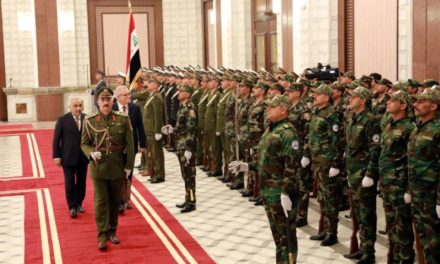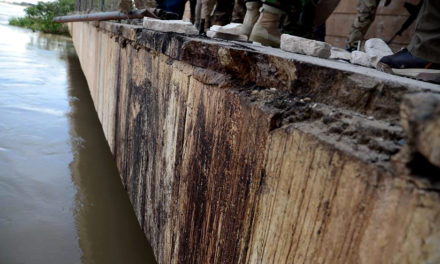(Kirkuk, Iraq. Photo: Tracey Shelton/PRI)
Negotiations in the Kurdistan Region of Iraq (KRI) to form a government continue between the two ruling parties, the Kurdistan Democratic Party (KDP) and Patriotic Union of Kurdistan (PUK). While it has been over four months since elections for the Kurdistan Regional Government (KRG), the two parties have reached an agreement on a separate issue, having the Kirkuk Provincial Council convene on February 18 to select a new governor. Surprisingly and in controversial fashion, the council will be meeting in the Kurdistan Region’s capital Erbil and not in Kirkuk. A few days after the announcement, Arabs and Turkmen of Kirkuk stated that they are not going to participate, as none of them were consulted about the session.
This session may not happen, not because of the Arabs and Turkmen, but because the PUK wants it to take place in Kirkuk and not in Erbil. The problem with policymakers from the PUK and KDP is that they have not yet grasped the idea that they cannot rule the city without cooperation with the Arabs and Turkmen and the same can be said for the latter two in regard to cooperation with Kurdish factions. Even if the Kirkuk provincial council convenes in Kirkuk and selects a Kurdish governor, the governor will be impotent because the city is secured by Iraqi Security Forces (ISF) who do not take orders from a governor and will further escalate ethno-sectarian tensions.
People of Kirkuk have suffered intensely from bad governance by both the Government of Iraq (GOI) and the KRG. GOI and KRG should start negotiations to find solutions for the long-standing disputes between them over Kirkuk. Both governments should understand the fact that neither side can impose their will on Kirkuk. The Arabization campaign by Saddam’s Ba’athist regime in the past, which brought thousands of families from other cities of Iraq into Kirkuk and forced local Kurds to abandon the province, could not erase the Kurdish identity of Kirkuk nor could the unilateral independence referendum by the KRG impose Kurdish will on others. Therefore, the disputes of Kirkuk must be resolved peacefully and inclusively by all ethnic groups.
Short-Term Solution
As a diverse and multi ethnic province, each group at some time has faced persecution or mistreatment, resulting in mistrust between Kirkukis. Mistrust has become a real issue especially in terms of security and administration. This mistrust cannot be restored by either deploying Kurdish Security Forces (Peshmerga) or by only having ISF present because the two different forces are controlled by different governments, which might lead to clashes and Kurds under the control of ISF might not feel secure. Therefore, special forces that contain all ethnicities of Kirkuk should be formed instead. The significance of forming such a security apparatus for Kirkuk is that every ethnic group will be involved in securing their home and most importantly citizens may no longer fear the forces as it will be all inclusive.
Having a so-called joint administration is not a solution because the different institutions of the city will still be controlled by the central and regional governments, which have been a failure in Kirkuk from the invasion of Iraq till present day. One administration composed of all ethnicities where interests and demands of all parties are met is needed for Kirkuk. In this mixed administration, the power is shared on all sides. All sides have to compromise on their interests so that the people of Kirkuk will live in peace, without fear of Erbil or Baghdad’s rule.
To reach this point, a new avenue with the people and their leaders should be established. In the past, people were marginalized, and leaders were only beholden to their parties. This has to be changed and the leader should actually represent the interest of the people, because people of Kirkuk have enormously suffered from bad governance, in particular as a direct result of GOI and KRG’s rivalry over jurisdiction of Kirkuk. The International community must play an important role, especially the United States who should have a solid plan to mediate between the two governments. Without mediation from the international community, this dispute will not cease to exist.
Long-Term Solution
There are two constitutional ways to determine the final status of the city. The first way is Article 140 of the Iraqi Constitution that explains the procedure to finalize the fate of disputed areas, which includes Kirkuk. The procedure is composed of three steps: normalization of the city, censusing the population, and holding a referendum to determine the will of the people of Kirkuk and other disputed areas. According to the constitutional article, this process should have been completed by December 31, 2007. Twelve years on and this article has yet to be implemented.
The main problem with Article 140 is that it depends on the majority of the votes to determine the fate of the province regardless of the will of the other ethnic groups. The question here becomes how to define “majority”? Is 50% +1 as majority suitable? This is important to determine because the Kurds in Kirkuk make up a slight majority and the other ethnic groups will refuse the annexation of the province to KRI territory. Therefore, this article is not well suited to determine the final status of Kirkuk. Otherwise, it would have been implemented on time.
Constitutionally, Kirkuk can become a semi-autonomous region, which is the second solution that is more of a possibility than the first one. Article 119 of the Iraqi Constitution allows one or more provinces to organize into a region just like the Kurdistan Region, which means that Kirkuk will neither be under the control of GOI or the KRG. This solution will equally satisfy all sides: Arabs, Kurds, and Turkmen. It will stop the dispute and enable the people of Kirkuk to govern themselves without being the victim of Baghdad and Erbil’s rivalry. This will lead to a new era of administration in the province as Kirkuk will be enjoying several constitutional rights that the KRI has long enjoyed and used for more autonomy from the federal government.
People of Kirkuk have been fed up with years of instability and bad governance. It is time for the Government of Iraq and the Kurdistan Regional Government to prioritize determining the fate of Kirkuk as a way to bring stability, prosperity and peace to its different ethnic groups.

Mohamed Jasm Bakr
Mohamed Jasm Bakr (Mera) is a student at the American University of Iraq, Sulaimani (AUIS) and a research assistant at the Institute of Regional and International Studies (IRIS) at AUIS.










